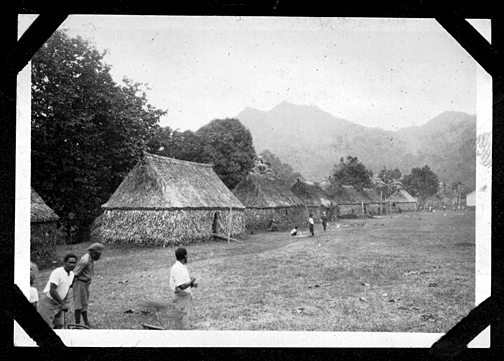During the summer of 1922, a group of University of Iowa faculty and graduate students with interests in the natural sciences embarked upon a four-month expedition to the South Pacific. Under the leadership of Prof. Charles C. Nutting of the Department of Zoology, the group visited the island nations of Fiji and New Zealand, gathering observations and specimens pertinent to their respective disciplines.
Prof. Nutting chronicled the expedition in a 1924 report, published as an installment of University of Iowa Studies in Natural History (v. X, no. 5; call no. QH1.I58). Based on its thorough index, the report covers a wide range of research interests, including anthropology, archaeology, botany, entomology, and zoology.
Recently, Special Collections & University Archives received additional documentation of this adventure from the perspective of Waldo Glock, then a graduate student in geology. (Mr. Glock would go on to a distinguished academic career at The Ohio State University.) His son, Waldo Glock, Jr., donated to the Archives his father’s scrapbook, journal, and a set of over 200 lantern slides recounting the journey.
We’ll leave the academic researching of this new collection to, well, the researchers. We couldn’t help but note, however, the journal entries for the voyagers’ last day at sea – September 2, 1922. First, Prof. Nutting’s official account:
“The sea became rather ‘lumpy’ as we neared the American coast. There was much drinking on board as the passengers were taking advantage of their last chance before reaching prohibition territory. There seemed to be little effort to restrain them and they kept up a veritable ‘rough house’ nearly all night with a good deal of profane and even indecent language.”
And now for graduate student Glock’s account:
“The Smoke room, scene of hilarity! Bottles of Scotch and glasses were everywhere. Norton was flushed of face and glassy eyed; Polly was follish drunk; Walsh was wild-eyed and red; Mong oozy eyed; Haines perfectly silly; Mrs. Brandeis itching for greater revels; Myrtle knew enuf to stop; Owen began to stagger… 2:30 a.m. they fell back exhausted, an incoherent mumble the last spark from the battered frames. Once having started there is no stopping, on and on, more, more – more, to the bitter end.”
And there you have it: Two accounts from two perspectives. While official records present evidence of an event, there is nothing like a diary to bring out the details. – David McCartney, University Archivist
